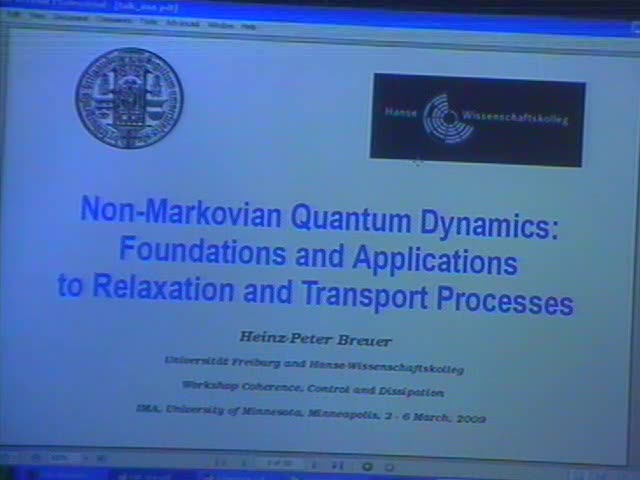Non-Markovian quantum dynamics: Foundations and applications to relaxation and transport processes
Presenter
March 2, 2009
Keywords:
- Non-Markovian processes
MSC:
- 62M07
Abstract
Realistic quantum mechanical systems are influenced through
the coupling to an environment containing a large number of
mostly uncontrollable degrees of freedom. This unavoidable
interaction of an open quantum systems with its environment
leads to the mechanisms of dissipation and damping, and to
a strong and often rapid loss of quantum coherence. The
talk begins with a brief introduction into the standard
theory of quantum mechanical relaxation which is based on
the Markov approximation and on the concepts of completely
positive dynamical semigroups and of quantum master
equations in Lindblad form. Many examples for this
approach are known from quantum optics, decoherence theory,
quantum Brownian motion and quantum measurement and control
theory. However, strong couplings or interactions with
low-temperature reservoirs generally lead to large
system-environment correlations which result in long memory
times and in a failure of the Markov approximation. To
describe the basic features of the non-Markovian quantum
dynamics of open systems we develop several new methods as,
for example, the technique of correlated projection
superoperators [1] and the concept of quantum semi-Markov
processes [2]. A number of examples and applications to
structured and finite reservoirs [3], to electron spin
dynamics in quantum dots [4], and to the problem of
quantum transport in nano-structures [5] will be discussed.
[1] H. P. Breuer, Phys. Rev. A 75, 022103 (2007).
[2] H. P. Breuer and B. Vacchini, Phys. Rev. Lett. 101,
140402 (2008).
[3] H. P. Breuer, J. Gemmer and M. Michel, Phys. Rev. E73,
016139 (2006).
[4] E. Ferraro, H. P. Breuer, A. Napoli, M. A. Jivulescu,
and A. Messina, Phys. Rev. B78, 064309 (2008).
[5] R. Steinigeweg, H. P. Breuer and J. Gemmer, Phys. Rev.
Lett. 99, 150601 (2007).
